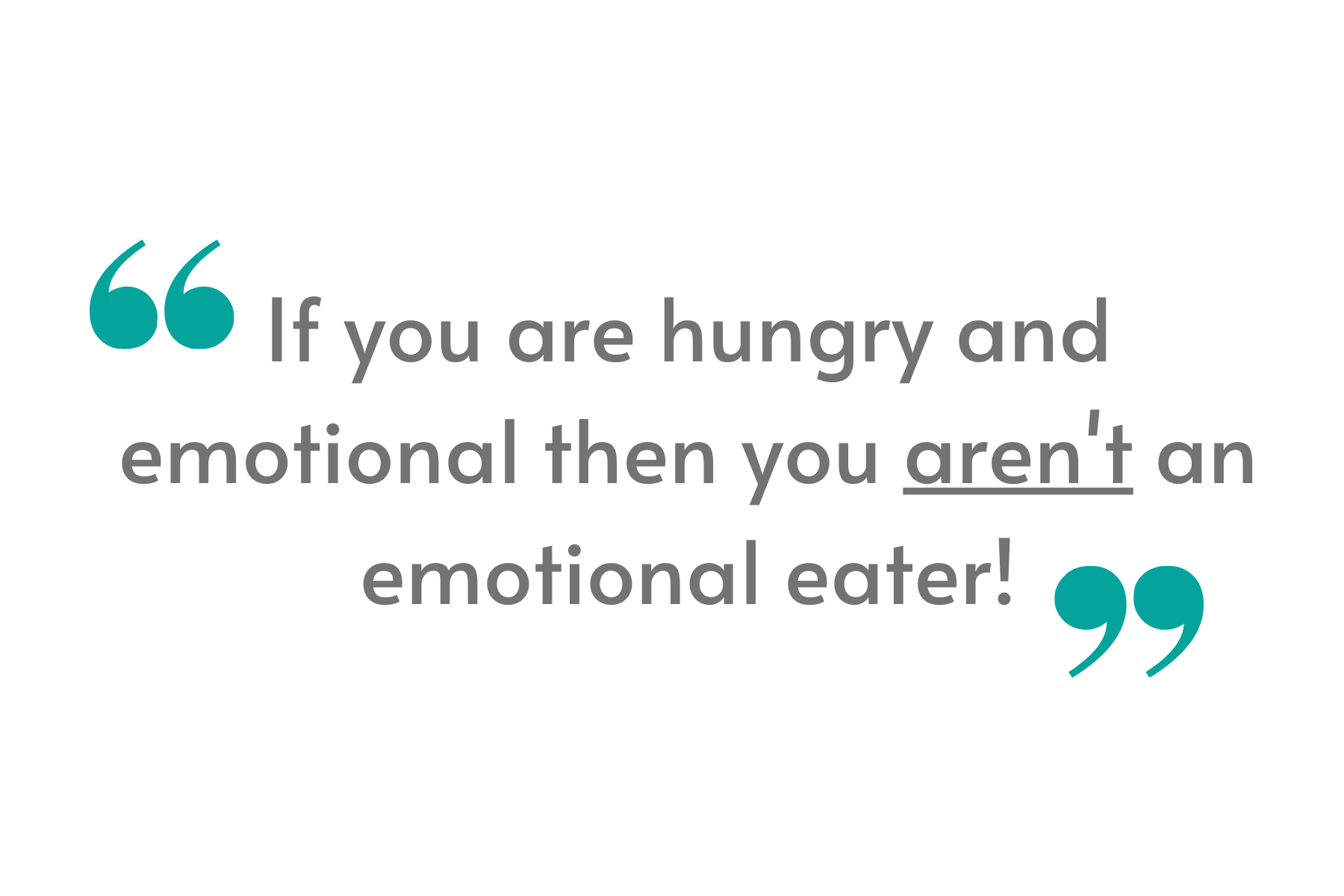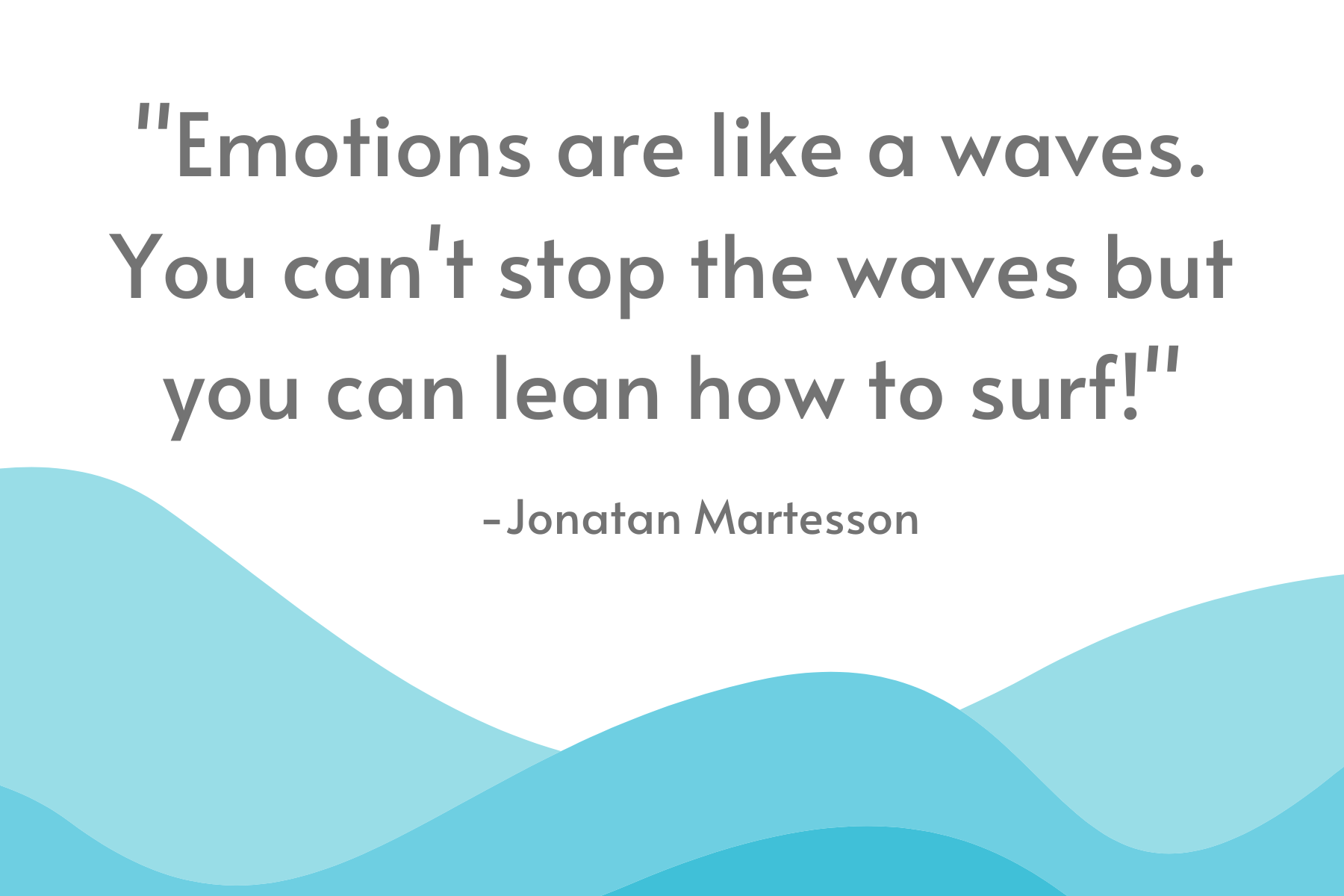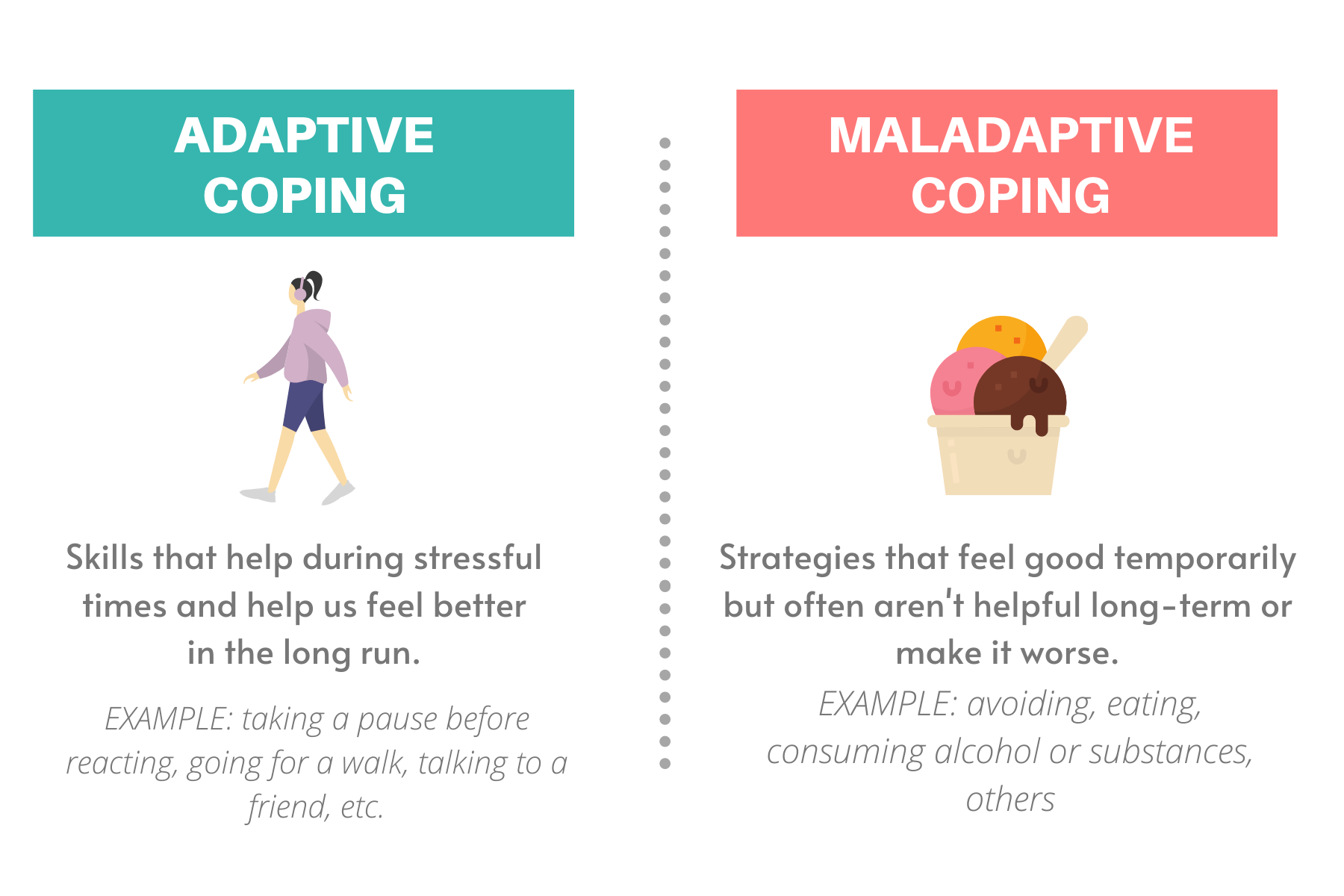Dietitian Strategies for Overcoming Emotional Eating
Sep 13, 2022
Emotional eating may include eating because we're sad, bored, stressed, lonely, looking for distraction, or using food as a reward. As Registered Dietitians we believe it is important to note that eating is a legitimate coping mechanism - it releases endorphins and can make us feel good! The issues arise when it is our main coping strategy or relied on at a frequency that is unsupportive of our health and well-being. In this article and accompanying podcast episode we’ll explore the root of emotional eating and five steps you can take to become more confident in navigating food and your emotions!
1. FUEL YOUR PHYSICAL BODY
Oftentimes people believe that they struggle with emotional eating when they are either experiencing blood sugar imbalances or low energy availability. Our body is hard-wired for survival! The stress of erratic blood sugars or the threat of low energy availability can cause cravings and a primal drive to eat. Therefore, before identifying as an emotional eater, consider checking in with your nutrition habits:
- Are you eating enough food to tell your body and brain you are safe and well fed?
- Are you eating enough protein to feel full and satisfied?
- Are you eating enough carbohydrate for your brain to think and regulate emotions?
- Are you balancing your meals to avoid blood sugar peaks and valleys that can lead to mood disturbances and cravings?
- Are you mentally satisfied from your meals and snacks because they are meals, food, or ingredients you genuinely enjoy?
- Is stress suppressing appetite cues and impacting your ability to meet your nutritional needs?
- Are you in a phase of your menstrual cycle where you need to offer yourself rest, additional nourishment, and compassion?
NOTES FROM DIETITIAN HANNAH:
- It is very common to see people identify as ‘emotional eaters’ when they are in a restrict and binge cycle or are intentionally restricting calories. In these cases, it may not be emotional eating but eating for true hunger and nourishment. Ensuring you are well fed puts you in a position to identify whether you are truly engaging in emotional eating or if you are actually under-nourished. If you are looking to overcome emotional eating, any intentional calorie deficit is not advised and will perpetuate this cycle making it incredibly difficult to combat emotional eating
- If you are dealing with high stress then your appetite may be suppressed. Inconsistently fuelling due to suppressed appetite cues can become a 'trigger' for emotional eating that actually stems from physical hunger. Developing strategies and tools to navigate stressors so that you can consistently fuel your body throughout the day (even in the absence of hunger cues!) is a strategy to address true hunger and behaviours that feel like emotional eating.
- Under-eating can make us more emotional as our brain requires nourishment to regulate emotions. In this case, not only are we more emotional because we are under-fuelling but we also do not have the nourishment to regulate the emotion itself. In this case, feeding our brain (and body) is an important step to prevent a heightened emotional state and have the ability to move through the emotion itself.
As Hannah quotes in the podcast episode that accompanies this article: "If you are hungry and emotional then you aren't an 'emotional eater!'"

2. LET GO OF SHAME & GUILT
It is common to feel ashamed or guilty for engaging in emotional eating. Shame and guilt are heavy emotions and makes the experience of emotional eating more difficult to overcome! However, food is inherently enjoyable and it is a normal human reaction to seek pleasurable sensations in the face of challenging emotions. Take a moment to offer yourself forgiveness and compassion! There is nothing ‘wrong’ with you for engaging in emotional eating. The challenge becomes when emotional eating becomes your only tool to move through challenging or stressful emotions. By offering yourself compassion and forgiveness you can shift to an uplifted emotional state that opens you up to exploring new tools to overcome emotional eating!
For example, a lack of compassion may sound like “I am so mad at myself for eating because I was stressed. I know how badly this makes me feel.” This inner dialogue may seem productive but it spirals us into more feelings of shame, frustration, and guilt. This can fuel further emotional eating! Infusing compassion into your dialogue could sound like “stress can be a hard emotion to feel and it is ok that I am struggling.” This compassion dialogue may make you feel better - but it’s not just about feeling warm and fuzzy on the inside! This compassion can put you in a powerful position to feel the emotion and develop new strategies to move through it.
3. IDENTIFY WHAT YOU NEED
Awareness of why you are eating puts you in a powerful position to address and navigate emotional eating at the root. For example:
- Are you looking for a mood booster? Eating lifts our mood by releasing feel good neurotransmitters (eg. dopamine). There is a reason for the classic movie scene where the girl reaches for a pint of ice cream after a break-up! If we understand that we are using food to feel better, we can dig deeper to understand whether eating will truly make us feeling better long-term or if there is a different supportive action that might offer us the boost we need. For example, going outside, exercising, connecting with a friend, watching a show, others.
- Are you eating for distraction or avoidance? Eating can be used us avoid an emotion we are unable to fully feel or distract us from a challenge we don't want to face. For example, if we feel sad we might suppress that sadness with food or if are experiencing a conflict we might choose a snack instead of having the difficult conversation. Understanding if our decision to eat is based in distraction or avoidance helps us navigate what we truly need to feel (or do) so we are less likely to seek food for distraction and avoidance.
- Are you eating to replace an unpleasant emotion with a more familiar emotion? For some people, emotional eating is a familiar experience that is followed by feelings like guilt and shame. Though guilt and shame are not pleasant emotions to experience, they may be more tolerable than other emotional experiences like sadness, grief, or anger. In this case, eating outside of physical hunger may be a subconscious strategy to replace a difficult emotion with a more familiar or tolerable emotion. In this case, the familiarly of guilt and shame may be easier to experience than the root emotion.
- Are you procrastinating something else you need to do? Sometimes eating is simply a tool to procrastinate whatever tasks we are avoiding! In this case overcoming emotional eating may simply be recommitting to action items that align with your personal goals, values, and responsibilities! And hey, we'd bet most people can relate to opening up the pantry for a snack instead of doing homework, working, or studying!
Reflecting on why you are eating helps you to recognize patterns and address emotional eating at its root. This helps direct you in discovering what types of tools and support you need in overcoming emotional eating and improving your emotional health and wellness.
4. FEEL YOUR EMOTIONS
Emotions are energy in motion. When we resist an emotion, it gets stuck! We can visualize our emotions like waves. Much like waves, emotions come and go. We can either drown or we can learn how to surf!

When an emotion gets stuck it will persist as a physical sensation in the body that can be uncomfortable. We might seek distraction or avoidance of the sensation by eating for temporary release. However, if we can learn to identify and feel our emotions we may find that they pass in time. With practice, it becomes easier to feel the emotion and we are less likely to turn to food to suppress the many emotions that are a part of the human experience!
Some tips:
- Notice the feeling. As mentioned, emotions are "energy in motion" and can often be felt as physical sensations in the body. For example, sadness may be felt as constriction in the throat, nervousness might feel like butterflies in your stomach, or you might feel hot when you get angry! Feeling the emotions in your body can help you as you let sit with the emotion and let it pass through you!
- Let go of labels. Have you ever found yourself labeling your emotions as 'bad' or 'negative'? Emotions can be uncomfortable at times! However, much like food, labeling our emotions as "bad' typically isn’t helpful. Part of overcoming emotional eating is accepting that unpleasant emotions happen and just because we are having an unpleasant emotion doesn’t make it (or us!) 'bad'. For example, it is uncomfortable to feel sad if a loved one passes away, to feel bored if you aren’t filling your days with activities that align with your values, or to feel stressed about preparing for an exam that you want to do well on. The sadness is a part of grieving, the boredom may be a sign to make fulfilling plans, and the stress is what prompts you to study. While sadness, boredom, and stress may be unpleasant - they are not inherently "bad". By accepting our emotions for what they are (and feeling them fully!) we may find that we no longer turn to coping strategy (like eating) to distract from the emotion itself.
- Look for the lesson. Oftentimes emotions are guiding us towards changes we'd like to make in our life, goals that we'd like to achieve, or values that matter to us. Looking for the lesson can help us embrace the emotions we experience and understand how they serve to guide us towards the life we'd like to lead. For example, perhaps you feel frustrated with your nutrition and exercise habits. Though it is unpleasant to feel frustrated, we might reframe frustration as a helpful emotion that serves to guide you back to nourishing and moving your body. If it didn't matter to you then you wouldn't have an emotional response. So in this case the frustration serves to realign your habits to make choices that align with your health and wellness!
5. EXPLORE NEW TOOLS
After acknowledging the challenging emotion that you are feeling you can implement new coping strategies to soothe, express, or move through the emotion.
Coping skills are strategies we use to manage our emotions in the moment. Coping skills can be adaptive meaning they help during stressful times. Some common examples include going for a walk, doing yoga, chatting with a friend, solving the problem at hand, using humour, or taking a break before reacting. All of these are examples of strategies that typically don’t make the event worse by harming ourselves or others.
However, sometimes we develop maladaptive coping skills. Maladaptive skills are usually counterproductive or cause negative consequences. They often work in the short term but in the long-term cause trouble. Some examples of maladaptive coping include avoidance, drinking, drugs, binging on foods that we find comfort in, and others. In the case of emotional eating, it often makes us feel better for a hot minute but typically doesn’t last much longer than that.

So how do we cope when life comes at us? Do we face it head on or do you avoid having to deal with it? Do we go for a walk or do we sit in front of the TV and indulge in some ice cream? Perhaps we do it all. Sometimes life calls for a pint of ice cream and other days it calls for a walk in the sunshine. As mentioned, emotional eating is a normal human reaction and sometimes may be the strategy we choose. However, when we develop a variety of coping skills we can ensure that emotional eating is one of many tools and does not negatively impact our health and wellness. In other words, perhaps you occasionally indulge in eating for comfort to self-soothe but also lean into adaptive tools that help you through challenging times!
A few considerations as you explore and adopt new tools:
- Take a beat. Eating can be an automatic response to an emotional reaction. Take a moment to reflect on the emotion you are experiencing and what you need to move through it. For example, noticing that you are bored and taking a pause before you open the pantry. Perhaps you are hungry and need a snack or maybe there is another task that would be more fulfilling!
- Reflection. After implementing the new coping strategy take a moment to reflect on the experience. Did the strategy you chose address your need? Would you use it again? Would you try something different next time? Curiosity and reflection can help you to determine what actions best fulfill different needs and 'work' for different emotions and experiences. For example, let's say you are sad and have a bath but you didn't find it to be helpful. Perhaps next time in the same situation you'll decide to try something different like going for a walk, chatting with a friend, watching a comforting show, etc.
- Therapy: Experiencing our emotions can be challenging and it can be difficult to adopt adaptive coping strategies on our own. Working with a therapist or psychologist can be an important resource to guide you through your emotions and develop strategies that support your health and wellness.
TIP: try making a list of activities you could try next time you feel a challenging emotion. For example, listening to music, going for a walk, walking, running, exercising, chatting with a friend, family member, or colleague, journalling, meditating, painting, drawing, etc. By having a list of ideas you may find it easier to take action on new coping strategies that help you move through the emotion and feel better long-term.
SUMMARY:
Even when we understand what's going on, many of us still need help breaking the cycle of emotional eating. It's not easy — especially when emotional eating has been a sole coping strategy for a number of years. So don't go it alone when you don't have to. Take advantage of expert help. This might include a therapist, psychologist, and/or a Registered Dietitian who can help you identify your eating patterns and make new choices that support your physical, mental, and emotional health and well-being. At Vitality Nutrition we support clients through our one-on-one programs to help them overcome their unique challenges and adopt a pattern of eating that supports their personal goals and values! If you are specifically looking to navigate emotional eating then we recommend booking in with Hannah Murray who specializes in food relationship and disordered eating.
Ready to bring the evidence-based nutrition support of our Registered Dietitians into your kitchen?
Hungry for more?
Get recipes, tips, and updates from the Vitality Nutrition team straight to your inbox!
Don't worry, your information won't be shared.

